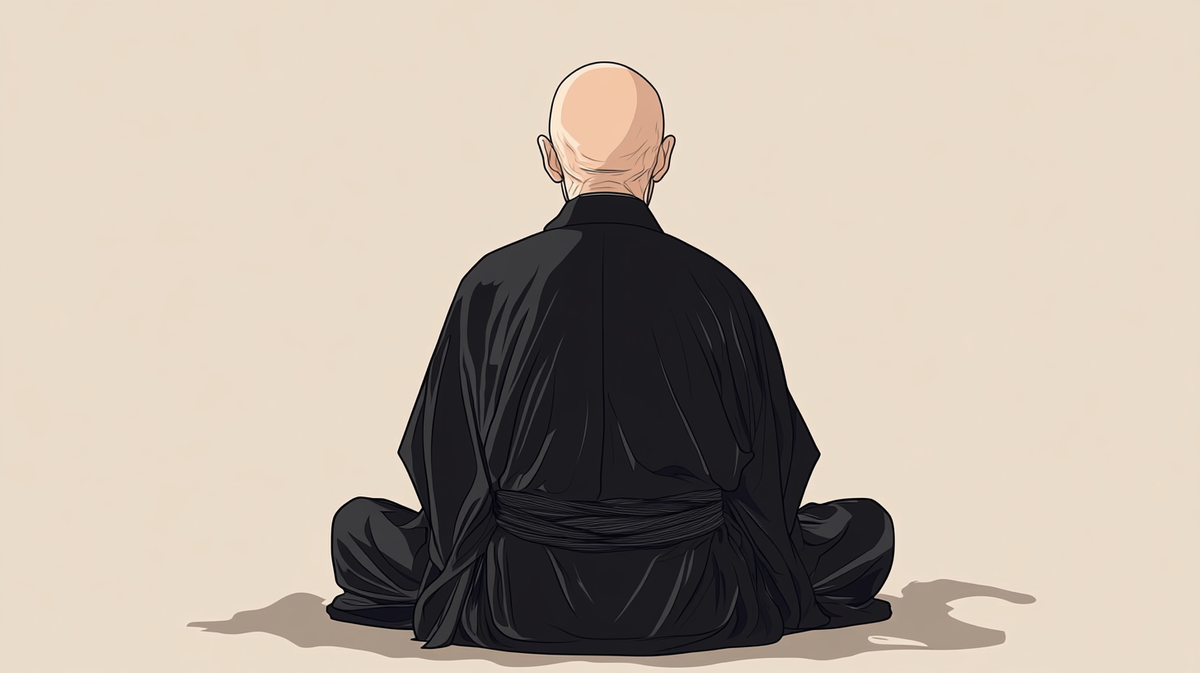The Zen Journey of Shohaku Okumura
Zen master Shohaku Okumura's journey from postwar Japan to "good-for-nothing" meditation reveals profound insights on finding peace and meaning through simply being, challenging our goal-driven society with timeless wisdom.

In a deeply personal and insightful interview, Zen Master Shohaku Okumura shares his life story and the profound wisdom he's gained through decades of Buddhist practice. From the ashes of post-World War II Japan to the serene forests of Massachusetts, Okumura's journey offers a fascinating glimpse into the heart of Zen Buddhism and its relevance in our modern world.
A Quest for Meaning in Postwar Japan
Born into a family that lost everything in the war, Okumura grew up in a Japan rapidly rebuilding itself. As a teenager in the 1960s, he found himself questioning the relentless pursuit of economic growth and the competitive education system. "To me, that kind of so-called progress or development is destruction," he reflects, noting how the rivers he once swam in became too polluted for such activities.
This disillusionment led young Okumura on a quest for the meaning of life. He delved into philosophy, science, and history, eventually concluding that life itself had no inherent meaning. It was at this critical juncture that he encountered the teachings of Zen master Kosho Uchiyama through a friend.
Encounter with Zen: A New Path
Uchiyama's first book resonated deeply with Okumura. He saw in Uchiyama a kindred spirit who had asked the same existential questions and found answers in Zen practice. This encounter set Okumura on the path to becoming a Zen monk.
The death of his friend at the young age of 17 further cemented Okumura's resolve. "I found there's no reason he had to die," he says, realizing the fragility of life and the urgency of pursuing a meaningful path.
The Practice of 'Just Sitting'
Okumura dedicated himself to the practice of shikantaza, or "just sitting," as taught by Zen master Dogen. This form of meditation, he explains, is unique in that it's not goal-oriented. "We should just sit without any expectation, even enlightenment," he says, echoing Dogen's teachings.
This concept of a practice that's "good for nothing" became central to Okumura's understanding of Zen. He admits it's a challenging sell in our goal-oriented society, yet he finds deep value in this approach that frees us from constant striving and self-improvement.
Challenges and Revelations
Okumura's journey wasn't without challenges. After ten years of intensive practice, he faced a crisis when physical ailments prevented him from continuing his rigorous monastic routine. This forced him to confront his own attachments and expectations, even within his spiritual practice.
It was during this difficult period that Okumura had a profound realization. Sitting alone, not as a practitioner or a priest, but simply as himself, he found a deep peace. "I don't need to be a good boy," he realized, freeing himself from the desire to be a "good Buddhist" and truly embracing the essence of "just sitting."
Zen in the Modern World
Okumura's teachings offer valuable insights for our contemporary world. He emphasizes the importance of understanding our interconnectedness with all beings and the environment. This awareness, he believes, is crucial in addressing the challenges of our time, from environmental destruction to social inequality.
He also speaks to the value of ritual and community in spiritual practice, while warning against empty formalism. True practice, he insists, must integrate form and spirit, body and mind.
A Legacy of 'Good-for-Nothing' Wisdom
Today, Okumura continues to teach and share the wisdom he's gained over decades of practice. He expresses gratitude for those who find value in his "strange teaching" of a practice that's "good for nothing."
His message is one of profound simplicity: to awaken to the fundamental reality of our interconnectedness and to live in harmony with all beings. It's a teaching that transcends Buddhism itself, offering a path to a more mindful, compassionate, and authentic way of being in the world.
"I don't care so much about the Buddhist institution or even the name of Buddhism. If people live with awareness and compassion, whether they call themselves Buddhist or not, that's fine. My mission is to transmit and continue this tradition, but if people in the future think they don't need something called Buddhism, that's okay. What matters is that they can see reality as it is, interconnected with all things."
As we navigate the complexities of modern life, Okumura's journey reminds us of the power of sitting still, of being present, and of finding meaning not in achievement or acquisition, but in the simple act of existing in harmony with the world around us.